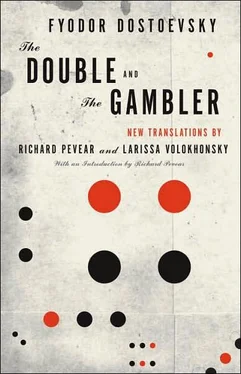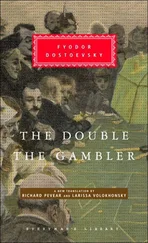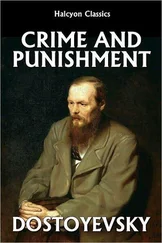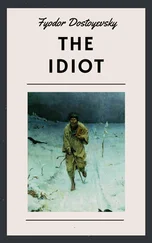Fyodor Dostoevsky - The Gambler
Здесь есть возможность читать онлайн «Fyodor Dostoevsky - The Gambler» весь текст электронной книги совершенно бесплатно (целиком полную версию без сокращений). В некоторых случаях можно слушать аудио, скачать через торрент в формате fb2 и присутствует краткое содержание. Жанр: Классическая проза, на английском языке. Описание произведения, (предисловие) а так же отзывы посетителей доступны на портале библиотеки ЛибКат.
- Название:The Gambler
- Автор:
- Жанр:
- Год:неизвестен
- ISBN:нет данных
- Рейтинг книги:4 / 5. Голосов: 1
-
Избранное:Добавить в избранное
- Отзывы:
-
Ваша оценка:
- 80
- 1
- 2
- 3
- 4
- 5
The Gambler: краткое содержание, описание и аннотация
Предлагаем к чтению аннотацию, описание, краткое содержание или предисловие (зависит от того, что написал сам автор книги «The Gambler»). Если вы не нашли необходимую информацию о книге — напишите в комментариях, мы постараемся отыскать её.
The Gambler — читать онлайн бесплатно полную книгу (весь текст) целиком
Ниже представлен текст книги, разбитый по страницам. Система сохранения места последней прочитанной страницы, позволяет с удобством читать онлайн бесплатно книгу «The Gambler», без необходимости каждый раз заново искать на чём Вы остановились. Поставьте закладку, и сможете в любой момент перейти на страницу, на которой закончили чтение.
Интервал:
Закладка:
“How are we going to reckon it up?” he began. “It has to be converted into thalers. Here, take a hundred thalers, a round figure—the rest, of course, won’t get lost.”
I silently took the money.
“Please don’t be offended by my words, you’re so touchy…If I made that observation, it was, so to speak, to warn you, and, of course, I have a certain right to do so…”
Coming back home with the children before dinner, I met a whole cavalcade. Our people had gone to have a look at some ruins. Two excellent carriages, magnificent horses! Mlle Blanche in the same carriage with Marya Filippovna and Polina; the little Frenchman, the Englishman, and the general on horseback. Passersby stopped and looked; an effect was produced; only it won’t come to any good for the general. I calculated that with the four thousand francs I had brought, plus whatever they had evidently managed to get hold of here, they now had seven or eight thousand francs. That is too little for Mlle Blanche.
Mlle Blanche is also staying in our hotel, along with her mother; our little Frenchman is here somewhere as well. The servants call him “M. le comte,” Mlle Blanche’s mother is called “Mme la comtesse”; well, maybe they really are comte and comtesse. [1] Count and countess.
I just knew that M. le comte would not recognize me when we gathered for dinner. The general, of course, did not even think of introducing us or of presenting me to him; and M. le comte himself has visited Russia and knows what small fry an outchitel [2] Teacher or tutor [Russian in French transliteration].
—as they call it—is there. He knows me very well, however. But, I must confess, I appeared at dinner uninvited; it seems the general forgot to give orders, otherwise he would surely have sent me to eat at the table d’hôte . [3] Common table.
I appeared on my own, so that the general looked at me with displeasure. Kindly Marya Filippovna showed me to a place at once; but my having met Mr. Astley helped me, and willy-nilly I wound up making part of their company.
I first met this strange Englishman in Prussia, on a train where we sat opposite each other, when I was catching up with our people; then I ran into him on entering France, and finally in Switzerland; twice in the course of these two weeks—and now I suddenly met him in Roulettenburg. Never in my life have I met a shyer man; he’s shy to the point of stupidity, and, of course, he knows it himself, because he’s not at all stupid. However, he’s very nice and quiet. I got him to talk at our first meeting in Prussia. He announced to me that he had been at Nordkap that summer, and that he would like very much to go to the Nizhny Novgorod fair. I don’t know how he became acquainted with the general; I believe he’s boundlessly in love with Polina. When she came in, he flushed a flaming crimson. He was very glad that I sat down beside him at the table, and it seems he considers me a bosom friend.
At table the Frenchman set the tone extraordinarily; he was careless and pompous with everyone. And in Moscow, I remember, he just blew soap bubbles. He talked terribly much about finance and Russian politics. The general sometimes ventured to contradict—but modestly, only enough so as not to definitively damage his own importance.
I was in a strange state of mind. Of course, before dinner was half-through, I managed to ask myself my customary and habitual question: “How come I hang around with this general and didn’t leave them long, long ago?” Now and then I glanced at Polina Alexandrovna; she ignored me completely. It ended with me getting angry and deciding to be rude.
It began with me suddenly, for no rhyme or reason, interfering in their conversation, loudly and without being asked. Above all, I wanted to quarrel with the little Frenchman. I turned to the general and suddenly, quite loudly and distinctly, and, it seems, interrupting him, observed that in hotels this summer it was almost impossible for Russians to dine at the table d’hôte . The general shot me an astonished glance.
“If you’re a self-respecting man,” I let myself go on, “you will unavoidably invite abuse and will have to put up with being exceedingly slighted. In Paris, on the Rhine, even in Switzerland, there are so many little Poles and sympathizing little Frenchmen at the table d’hôte that it’s impossible to utter a word, if you happen to be a Russian.”
I said it in French. The general looked at me in perplexity, not knowing whether he should get angry or merely be astonished that I had forgotten myself so.
“That means that somebody somewhere has taught you a lesson,” the little Frenchman said carelessly and contemptuously.
“In Paris I began by quarreling with a Pole,” I replied, “then with a French officer who supported the Pole. And then some of the Frenchmen took my side, when I told them how I wanted to spit in the monseigneur’s coffee.”
“Spit?” the general asked with pompous perplexity, and even looked around. The little Frenchman studied me mistrustfully.
“Just so, sir,” I replied. “Since I was convinced for a whole two days that I might have to go to Rome briefly to take care of our business, I went to the office of the Holy Father’s embassy in Paris to get a visa in my passport. {2} 2 Until 1870, the Papal States in central Italy were under the sovereignty of the pope of Rome and maintained their own embassies in other capitals.
There I was met by a little abbé, about fifty years old, dry and with frost in his physiognomy, who, having heard me out politely, but extremely dryly, asked me to wait. Though I was in a hurry, I did sit down, of course, took out L’Opinion nationale , {3} 3 L’Opinion nationale was a liberal French newspaper which condemned the policies of tsarist Russia in Poland.
and began reading some terrible abuse of Russia. Meanwhile, I heard someone go through the next room to see monseigneur; I saw my abbé bow to him. I addressed him with my former request; again, still more dryly, he asked me to wait. A little later another stranger came, but on business—some Austrian. He was listened to and at once taken upstairs. Then I became extremely vexed. I stood up, went over to the abbé, and told him resolutely that since monseigneur was receiving, he could finish with me as well. The abbé suddenly drew back from me in extraordinary surprise. It was simply incomprehensible to him how a Russian nonentity dared to put himself on a par with monseigneur’s visitors. In the most insolent tone, as if glad that he could insult me, he looked me up and down and cried: ‘Can you possibly think that Monseigneur would interrupt his coffee for you?’ Then I, too, cried, but still louder than he: ‘Let it be known to you that I spit on your monseigneur’s coffee! If you do not finish with my passport this very minute, I’ll go to him myself.’
“ ‘What! Just when the cardinal is sitting with him!’ the abbé cried, recoiling from me in horror, rushed to the door, and spread his arms crosswise, showing that he would sooner die than let me pass.
“Then I answered him that I was a heretic and a barbarian, ‘ que je suis hérétique et barbare ,’ and that to me all these archbishops, cardinals, monseigneurs, etc., etc.—were all the same. In short, I showed him that I would not leave off. The abbé gave me a look of boundless spite, then snatched my passport and took it upstairs. A minute later it had a visa in it. Here, sirs, would you care to have a look?” I took out the passport and showed the Roman visa.
“Really, though,” the general began…
“What saved you was calling yourself a barbarian and a heretic,” the little Frenchman observed, grinning. “ Cela n’était pas si bête .” [4] That was not so stupid.
Интервал:
Закладка:
Похожие книги на «The Gambler»
Представляем Вашему вниманию похожие книги на «The Gambler» списком для выбора. Мы отобрали схожую по названию и смыслу литературу в надежде предоставить читателям больше вариантов отыскать новые, интересные, ещё непрочитанные произведения.
Обсуждение, отзывы о книге «The Gambler» и просто собственные мнения читателей. Оставьте ваши комментарии, напишите, что Вы думаете о произведении, его смысле или главных героях. Укажите что конкретно понравилось, а что нет, и почему Вы так считаете.












